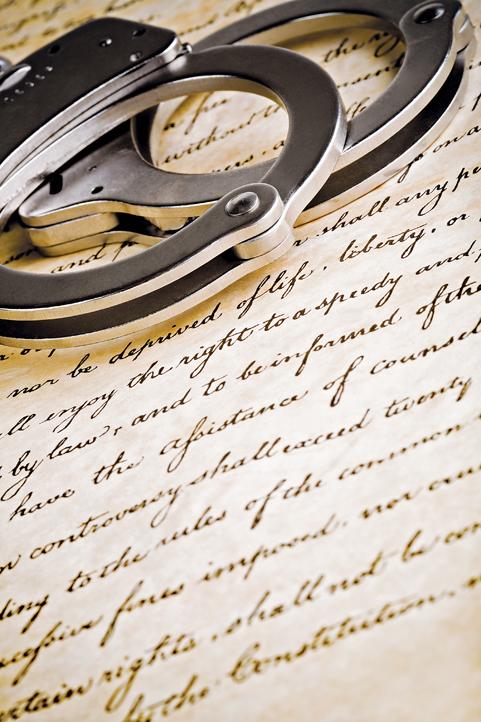Know your rights, what they are
Handcuffs on the U.S. constitution
November 17, 2010
We all have rights, every single one of us. Our rights come from all sorts of places: the law, the constitution and even some natural law/rights. Every now and then you hear someone proclaim they have a right to do something. But do they really?
Nowadays more people are using the statement, “I have a right to do whatever.” Have we suddenly gained a ridiculous amount of rights? Or are we just more informed about our rights?
The sad reality is that we are far less informed about our rights than ever before. Although it doesn’t seem that bad, it’s really pathetic to see someone make up a random right. Therefore, we all need to inform ourselves about our rights so we don’t look like idiots.
Let’s take a look at some of the well-known “rights” people have created. Most people have Facebook. One of the big issues with Facebook is privacy. Most people proclaim they have a right to keep what is on Facebook private and not get in trouble for things posted on Facebook. This is clearly not a right, but let’s examine why that is.
First of all, let’s see if it’s in the Constitution. Nope, I checked; it’s not. In fact, the Constitution never mentions the idea of privacy in it. Therefore that outlet is gone. Next let’s look at law. There are privacy laws out there, but they work against this claim, so that’s busted. Finally let’s see if this is just a common sense right or a natural right. Although it would be really convenient for some to have it private, it just doesn’t make sense. This is because of the nature of Facebook and the Internet.
Facebook is public, that’s the whole idea behind it, and everyone knows it when they sign up. Now some may say the Fourth Amendment’s protection against unreasonable searches and seizures shields you in this Facebook case. Sorry, Facebook users, it doesn’t. The reason why is because in this case, you are giving consent to Facebook by signing up and agreeing to their policy to have things viewed by the public. It doesn’t work if you are giving consent in a way for people to see what you post. If you know it’s going to be public, it’s your fault if you post something damaging to your reputation there. So the myth that Facebook privacy is a right: busted.
Some people actually know the laws, but there is still some confusion on how they works. Every individual has rights. These rights come from all sorts of places.
A common misconception is how they work. The problem is many people create their own interpretation of the right, and some people don’t know when their rights end. First let’s look at my favorite “right” mistake, which is misinterpretation. The Second Amendment, amusingly enough, gets translated in all sorts of ways. The Second Amendment gives you the right to bear arms. This, no doubt, is kind of vague. Therefore a mutated spawn of translations were bound to come out of this amendment.
Certain interpretations include the right to carry a weapon with you everywhere or the right to fire a weapon anywhere or the right to arm bears. These no doubt are wrong in many ways. A famous example of someone using this right incorrectly was a while ago in New York when a man walked around with a Claymore on his back. I’m afraid that’s not really a right — sorry, folks.
Some would argue against this and say this point basically makes the Second Amendment seem irrelevant and that an individual does not have any rights. However this is not what I am saying at all.
The thing is, we all need to draw a line somewhere. These lines are drawn by the laws in place. For example, the Brady Bill makes getting a weapon more difficult, because they do background checks. This being said, you still have a right to own a weapon, and in certain situations or places, you are allowed to carry a weapon. You have to draw the line, because it would be really bad if people started bringing all sorts of weapons into classrooms — it would not end well. But as you can see, there is a major difference between owning and carrying a gun in certain places and carrying a broadsword in downtown New York.
There is also the issue on when your rights end. In law, your rights end when you violate other’s rights. That means if you attempt to murder someone, you lose some of your rights. So if any of you commit any serious crimes, which I strongly discourage, don’t be surprised if there is negligence of your rights thereafter.
Another issue is that people don’t know when to use their rights. This really comes into play in law enforcement.
When it comes to law enforcement issues, you have a considerable amount of rights. In a perfect world, everything would go smoothly, and no one would misuse their power.
This is a fantastical idea.
Law enforcement officials, at times, misuse their power or do things that may be questionable. A misconception is that whatever the police officer states or does is legal or correct. There are instances where that is not the case. Because of these instances, you need to know your rights, so you can prevent yourself from situations like these.
Through all of these mistakes there is hope. You can avoid making dumb mistakes like these by knowing your rights. Know your rights so you don’t cry wolf, and know them so you don’t make false interpretations; it may be slightly painful.







